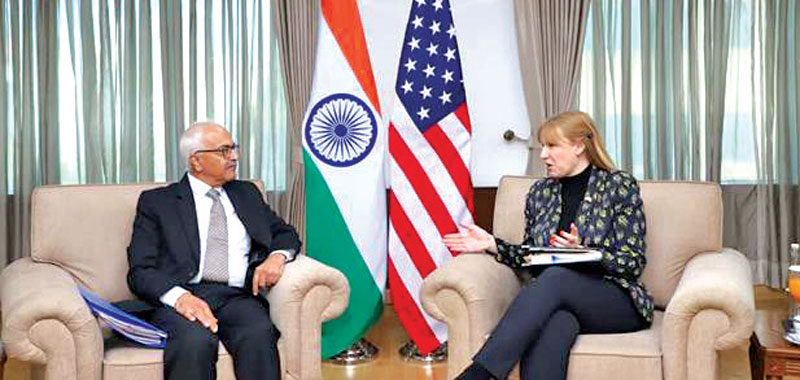India, US hold homeland security dialogue in Delhi
Subhashis Mittra
India and the United States (US) recently reviewed the progress of their ongoing cooperation in counter-terrorism and security domains—the key pillar of the bilateral strategic partnership, at a homeland security dialogue in New Delhi. The two sides discussed steps that can be taken to bolster bilateral efforts to combat terrorism and violent extremism, drug trafficking, organised crime and ensure transportation security.

They also reaffirmed their commitment to strengthening the vibrant people-to-people ties between the two countries, by taking steps to enable safe and legal migration, counter illegal migration, human trafficking, money laundering, cyber-crimes, and misuse of the cyber domain for illegal activities, including terror-financing.
The two sides were led by Ajay Bhalla, home secretary, Union ministry of home affairs, Government of India, and Kristie Canegallo, acting deputy secretary, US department of homeland security, respectively. The co-chairs reiterated their keen interest in consolidating the mutually beneficial collaboration between the respective law enforcement agencies through exchange of information, capacity building, technical assistance and regular meetings of sub-groups set up under the framework of the Homeland Security Dialogue.
The dialogue concluded with the signing of a Memorandum of Cooperation on law enforcement training between the US Federal Law Enforcement Training Centre and India’s Sardar Vallabhbhai Patel National Police Academy which will further deepen bilateral security cooperation. Both sides agreed to hold the next round of the Senior Officials’ Homeland Security Dialogue in Washington DC at a mutually convenient date.
Besides cooperation in combating terrorism, money laundering and organised crime, the two sides discussed activities of pro-Khalistani elements in the US. The Indian delegation is believed to have raised the issue of the activities of pro-Khalistani elements on US soil and also their active support and funding to separatist elements based in India.
The meeting was held against the backdrop of a row over the alleged assassination attempt on top Khalistani separatist Gurpatwant Singh Panun, a US citizen. The US has been demanding accountability in the matter. India is also seeking action against the pro-Khalistan elements involved in the July 2023 attack on the Indian consulate in San Francisco.
The National Investigation Agency (NIA) has identified more than 50 pro-Khalistani activists who attacked the consulate in San Francisco. New Delhi is also pushing for the extradition of 26/11 Mumbai terror attacks accused, Tahawwur Hussain Rana. A US court has dismissed Rana’s appeal against extradition.
While discussing ways to deal with illegal migration, the two sides explored the possibility of sharing biometric information as many illegal migrants may get rid of their travel documents. There was some discussion on specific ways of dealing with such cases, including detention and deportation of illegal migrants within 30 days.
Deliberations also took place on the US’ efforts to restrict access to fentanyl, a potent synthetic opioid. There have been reports in the US of drug overdose deaths arising out of the consumption of fentanyl. The Centre for Disease Control and Prevention (CDC) says on its website that fentanyl is sold through illegal drug markets for its heroin-like effect.
The leaders reaffirmed the need to deepen information-sharing efforts to prevent diversion of pharmaceuticals and other chemicals of concern used as precursors for illicit fentanyl and other illicit synthetic drugs. The US and China have already set up a counter-narcotics working group to curb the production and trade of fentanyl.
The US Homeland Security Department acknowledged that the dialogue between the two sides has deepened the strategic partnership between the United States and India on issues ranging from counter-narcotics cooperation and Customs-to-Customs collaboration to combatting terrorism and cybercrime and addressing irregular migration.
During the meeting, the leaders reaffirmed the commitment of the United States and India to strengthen access to lawful immigration pathways while enforcing immigration law to include returns of individuals who do not have a legal basis to remain in the United States.
They also agreed to work together to expand law enforcement cooperation to target smugglers who prey and profit on vulnerable migrants. The Homeland Security Dialogue also acknowledged the work of the US-India Counter-narcotics Working Group, which guides the joint efforts of both sides to address drug regulatory issues, law enforcement cooperation and collaboration, coordination in multilateral fora and drug demand reduction efforts.
At the conclusion of the Dialogue, the leaders signed a Memorandum of Cooperation to expand law enforcement collaboration between the United States and India. The new Memorandum between the Federal Law Enforcement Training Centres and India’s National Police Academy institutionalises police training cooperation between our governments through the sharing of best practices and joint programming.
“The Department also looks forward to building upon these productive discussions and commitments as we continue working to strengthen our partnership with India to further our shared security interests,” the US Homeland Security Department said.

